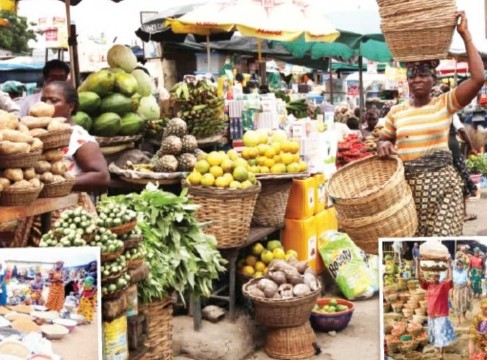Business
Cash crunch worsens, food spending drops by N3tn

,,,,,,Nigerians spent N3.05tn less on food and other household consumption in the first half of 2023.
When adjusted for inflation, Nigerians spent N21.78tn on household consumption of goods and services, a 17.32 decline from the N24.84tn they spent in the corresponding period of 2022, according to the National Bureau of Statistics ‘Nigerian Gross Domestic Product Report (Expenditure and Income Approach): Q1, Q2,’ report released on Thursday.
Based on the NBS report, the amount spent by households on goods and services rose to N61.08tn in nominal terms (current purchasers’ value). However, when adjusted for inflation (at 2010 purchaser’s values), a real reflection of actual value, household consumption fell, weighed down by worsening economic conditions.
,,,,,,Household consumption expenditure consists of expenditure, including imputed expenditure, incurred by resident households on individual consumption goods and services, the statistics body explained.
Commenting on household consumption in real terms (at 2010 purchaser’s values), the NBS said, “Household final consumption, in real terms, grew by -24.95 per cent and 3.30 per cent in Q1 and Q2 of 2023 respectively, on a year-on-year basis.
“Moreover, the growth rate of Q1 of 2023 was lower compared to the growth rate of the corresponding quarter of 2022 which was 8.66 per cent and Q2 of 2023 was higher than Q2 of 2022 which recorded -5.21 per cent.”
The statistics body highlighted that rising prices, the cash crunch recorded earlier in 2023, and the current challenging economic conditions were responsible for the negative growth of household consumption especially in the first quarter of 2023.
,,,,,,Household consumption accounts for the largest share of Nigeria’s GDP. The NBS expanded, “Household Consumption accounted for the largest share of real Gross Domestic Product at market prices, representing 57.18 per cent and 64.05 per cent in Q1 and Q2 of 2023 respectively, compared to 78.02 per cent and 63.65 per cent in the corresponding quarters of 2022.”
In Q1, 2023, the quarter where cash was scarce in the country, consumption spending by households declined by 24.95 per cent (N3.42tn) to N10.29tn year-on-year. In Q2, following an increased availability of cash, household consumption spending rose by 3.29 per cent y-o-y to N11.49tn.
While growth was recorded between Q1 and Q2, it was largely subdued. In the first quarter of 2023, Nigeria’s GDP grew by 2.31 per cent on a year-on-year basis because of cash scarcity in the economy. In Q2, GDP growth increased slightly to 2.51 per cent. However, inflation rose to 22.79 per cent by the end of June (it is now at 27.33 per cent as of October’s ending), 4.19 percentage points higher than the 18.60 per cent it was in June 2022.
Food, a major driver of inflation, surged to 25.25 per cent (it is now at 31.52 per cent as of October), 4.65 percentage points higher than the 20.60 per cent it was in June 2022.
Nigerians spend most of their income on food. Data compiled by Picodi, an international e-commerce organisation, revealed that the average Nigerian household spends about 59 per cent of its income on food. This is the highest in the world, according to the report published in August.
One of the most consumed staples in the country, rice, has recorded an over 37 per cent increase in price, a report titled, ‘AFEX Wet Season Crop Production Report for 2023, recently disclosed.
Rising inflation driven by lingering insecurity in major food-producing areas, high cost of transportation driven by rising energy costs occasioned by petrol subsidy removal, activities of middlemen in the food distribution channels, as well as shocks from legacy infrastructural bottlenecks, and the recent unification of the foreign exchange market segments has weighed negatively on consumer prices.
Recently, The PUNCH reported how Nigerians were being negatively affected by rising food prices.
An educator, Mrs Grace Onofomi, told The PUNCH, “The prices of things have shot up really. I bought Dano full milk at N4,800 recently. As of yesterday, it was N5,300.
“Everything in the market has gone up drastically. Spaghetti used to be N550, now it is N650/N700. Prices of sugar have also gone up. Household items, the price of tomatoes, rice, staples, and more are higher now.”
An Abia State-based banker, Irene Smith, added, “My salary doesn’t even last up to two weeks anymore. When you get to the market you can’t even buy anything because of the way prices keep increasing.”
In its half-year review of the economy, the Manufacturers Association of Nigeria revealed that the inventory of unsold finished products in the manufacturing sector rose to N271.9bn during the first half of 2023, compared to N187bn in the corresponding period of 2022.This was a substantial N84.88bn (45.4 per cent) increase. Blaming inflation, MAN said, “This increase in inventory can be attributed to a weakened purchasing power of the consumers, brought about by diminishing real household income resulting from the ongoing escalation of inflationary pressures, compounded by the scarcity of naira in the first quarter of the year and the aftermath of the subsidy removal.”
Recently, the International Monetary Fund predicted that inflation will slow the country’s economic growth to 2.9 per cent in 2023.
38.8% Nigerians to survive on less than $2.15/day by 2024 — World Bank
Meanwhile, the World Bank expects the share of Nigerians living below the international poverty line to hit 38.8 per cent in 2024.
This will be an increase from the 37.5 per cent it currently is in 2023. Slow growth and rising inflation are expected to be responsible for this. The bank stated that these economic challenges will contribute to an increase of 2.8 million people in poverty in the country. It revealed this in a report titled, ‘Macro Poverty Outlook: Country-by-country Analysis and Projections for the Developing World,’ released recently.
,,,,With inflation continuing to rise, the bank predicted, “The share of Nigerians living below the international poverty line is expected to peak in 2024 at 38.8 per cent before beginning a gradual decline, as inflation cools down and economic growth picks up.”
According to World Bank’s data the international poverty line is pegged at $2.15/ day. Between January and May 2023, four million Nigerians became poor due to rising inflation, the Bretton Woods institution earlier revealed in the June 2023 edition of its Nigeria Development Update.
Economists react
The spending power of Nigerians has fallen drastically, experts noted, and this is behind the drop in consumer expenditure.
,,,,,A professor of economics at the Olabisi Onabanjo University, Sheriffdeen Tella, said rising inflation, as well as the naira scarcity occasioned by the CBN’s plan to redesign the naira impacted negatively on consumer spending during the period in review.
“The economic problem was already showing at the beginning of the year. People don’t have money, so they started adjusting their spending towards what is of priority to them. By the time of the elections, things were already very difficult. They were further compounded by the removal of subsidy,” he said.
Tella, added, “So, the drop is not unexpected because domestic output was already going down. Inflation was already high, so people started adjusting their consumption towards what could be their priority, especially food and medicine.”
On his part, a Professor of International Economic Relations at Covenant University, Jonathan Aremu described a drop in consumer expenditure at a time of runaway inflation as dangerous for the economy.
Aremu stated, “If prices are increasing and consumer expenditure is reducing. That shows the level of poverty in the country. When there is no money, people will tend to spend less on things like clothing. But if it is affecting food, then it is a major crisis.”
The Chairman, Agric. Development Farmers Association of Oyo State, Salihu Imam, lamented to The PUNCH, that the country is not producing enough to feed its teeming population.
…..He said, “We are not producing in sufficient capacity to even feed Nigerians. The cost of production has gone up, and people are experiencing hunger. Currently, only starchy foods are a bit affordable for Nigerians.
“Many people are resorting to eating garri because that’s what they can afford. As I speak with you now, I am in a market in Ibadan, and food items are very expensive. We just bought a bag of rice for N40,000, and it’s challenging to obtain.”
“We need to transition from small-scale farming to mechanised farming. The government must address issues of insecurity and offer essential support to farmers. Are our farmers currently able to work…..on their farms without fear? To boost the economy, we must ensure that people can engage in farming activities by providing adequate security,” former Zenith Bank Chief Economist, Marcel Okeke, added.
-

 Metro/Crime6 days ago
Metro/Crime6 days agoVideo: “I use different uniforms, ID card on special robbery operations” – Dismissed Nigerian Soldier confesses
-

 Politics5 days ago
Politics5 days agoOndoDecides: See official results collated per Local Government
-

 Osun News3 days ago
Osun News3 days agoArrested OSTMS Chairman, Alowonle On Life Support, As Govt Seeks Prosecution Head of Anti-Kidnapping Squad
-

 Politics4 days ago
Politics4 days agoTinubu sacks top government official, names replacement (photos)
-

 Osun News3 days ago
Osun News3 days agoPolice Arrest Gov Adeleke’s aide, Alowonle
-

 Politics5 days ago
Politics5 days agoOGSIEC Announces 2024 Local Government Election Results
-

 Politics6 days ago
Politics6 days agoOndoDecides: Guber Election Results From Units Emerge
-

 Osun News6 days ago
Osun News6 days agoGov Adeleke Approves Fresh Appointment (Photo)







